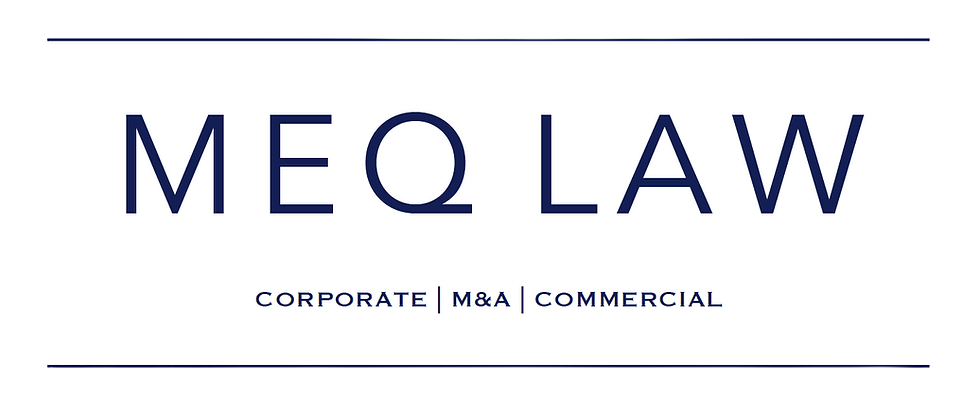Understanding Legal Options: ESOP vs. RSU Plans Explained
In the dynamic landscape of employee compensation, businesses are constantly seeking ways to attract, retain, and motivate talent. Two powerful tools in this regard are Employee Stock Option Plans (ESOPs) and Restricted Share Unit (RSU) Plans. These equity-based compensation strategies not only incentivize employees but also align their interests with the company's long-term success. At MEQ Law, we help businesses understand the legal intricacies and benefits of these plans, ensuring they make informed decisions that benefit both the company and its employees. Let's delve into the unique attributes of ESOPs and RSUs and how they can transform your business's approach to employee compensation.
What are Employee Stock Option Plans (ESOPs)?
Employee Stock Option Plans (ESOPs) provide employees the option to purchase company stock at a predetermined price after a specific vesting period. This effectively grants employees the opportunity to become shareholders, fostering a culture of ownership. ESOPs are particularly popular in startups and fast-growing companies as they help retain key talent without an immediate outlay of cash.
Advantages of ESOPs
One of the primary advantages of ESOPs is their potential to significantly increase employee motivation and loyalty. When employees have a stake in the company's success, they are more likely to be committed and engaged in their roles. Additionally, ESOPs can create substantial financial rewards for employees, especially if the company's stock value rises. For employers, ESOPs offer flexibility in structuring vesting schedules and exercise periods, allowing for tailored solutions that align with business goals.
Considerations and Legal Framework
Implementing an ESOP involves navigating a complex legal landscape. Companies must comply with securities laws and tax regulations to ensure compliance and maximize the benefits. At MEQ Law, we guide businesses through these complexities, crafting ESOP strategies that align with corporate objectives while safeguarding against potential legal pitfalls.
What are Restricted Share Unit (RSU) Plans?
Restricted Share Units (RSUs) are another form of equity compensation where employees receive company shares, or the cash equivalent, upon fulfilling certain conditions such as vesting periods or performance milestones. Unlike ESOPs, RSUs do not require employees to purchase shares, making them an attractive option for employees.
Advantages of RSUs
RSUs provide a straightforward approach to equity compensation, removing the financial burden of purchasing shares from employees. This feature makes RSUs an appealing choice for companies looking to offer immediate value to their employees. Additionally, RSUs are ideal for companies seeking a clear and transparent compensation structure as they are directly tied to the company's stock value at the time of vesting.
Considerations and Legal Framework
The implementation of RSU plans requires careful consideration of tax implications and regulatory compliance. Companies must navigate complex accounting and reporting requirements to ensure legal compliance. MEQ Law offers expert guidance on structuring RSU plans that minimize tax burdens while maximizing the benefits for both the company and its employees.
Key Differences Between ESOPs and RSUs
While both ESOPs and RSUs serve as valuable tools for employee compensation, they differ significantly in their structure and implementation. ESOPs require employees to purchase stock, which means potential financial risk but also greater potential reward. RSUs, on the other hand, directly grant shares upon vesting, offering immediate financial value without an upfront cost to employees. These distinctions are crucial when deciding which plan aligns best with your organization's objectives and financial strategies.
Making the Right Choice for Your Business
Choosing between ESOPs and RSUs depends on various factors such as your company's size, growth stage, and financial goals. Startups might lean towards ESOPs to conserve cash, whereas established companies may prefer RSUs for their simplicity and immediate value delivery. At MEQ Law, we provide bespoke advice, ensuring your choice of employee compensation plan aligns with both your legal obligations and your strategic objectives.
Maximize Your Employee Compensation Strategy
Understanding the nuances of ESOPs and RSUs can significantly enhance your company's ability to attract and retain top talent. By aligning employee interests with company performance, these plans contribute to building a motivated and committed workforce. However, the complexity of legal compliance requires expert guidance to maximize the benefits while mitigating risks.
Unlock Your Business's Potential Today!
At MEQ Law, we specialize in crafting tailored employee compensation strategies that align with your business goals and legal requirements. Whether you're considering ESOPs or RSUs, our team provides the expertise necessary to navigate the complexities of equity compensation. Contact us now to explore how we can empower your business and enhance your employee retention strategy.
Your journey towards an empowered workforce begins here. Reach out to MEQ Law today to discover the right equity compensation plan for your organization. Let's work together to unlock the full potential of your business and drive success through strategic employee engagement.











